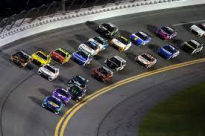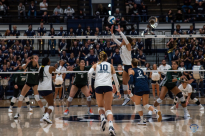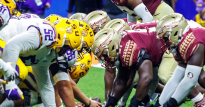Column: Time for Change to the One-and-Done Rule
Andrew Wiggins, Jabari Parker and Julius Randle are currently the faces of college basketball. All incredibly gifted athletes, the trio headlines the 2014 NBA Draft class, which is regarded as the best in over a decade. While each of the three hopes to lead their respective program to a National Championship, the end result will be the same, regardless of whether they win it all or get knocked out in the first round: they’ll leave.
The “one-and-done” rule has ruined college basketball. Since the inception of the rule in the 2005 NBA Collective Bargaining Agreement, the landscape of college basketball has been flooded with talented freshmen, who have no interest in playing college ball.
For the fans of programs who recruit these players, having a player with NBA-talent on the roster is incredibly exciting, even if it is only for one season.
For the player, a year of college is beneficial, as it is an extra year to develop their game and mature as a person, before taking the leap to the professional level.
All that being said, it’s time for a rule change. While there are many viable options, the system that seems to make the most sense is similar to the one used in baseball. The player may either declare for the NBA Draft directly from high school, or he must play at least two years of college ball.
The precedent for players to declare for the draft directly out of high school has been set. Between 1995 and 2005, the NBA saw many prep-to-pro players become stars in the league. Kevin Garnett, Kobe Bryant, Tracy McGrady, LeBron James and Dwight Howard all quickly became stars, despite the fact that none of them attended a single year of college. While this time frame also included draft busts like Kwame Brown and Eddy Curry, the successes far outweigh the failures.
Over the last eight years, Greg Oden, Kevin Durant, Derrick Rose, Michael Beasley, John Wall, DeMarcus Cousins, Kyrie Irving and Anthony Davis have defined college basketball. Each player seemed NBA-ready in college and declared for the draft after one year. With the exception of Oden who was hobbled by injuries, and Beasley who had off-the-court issues, every one of these players has become an All-Star or played at a high level. Durant, Rose, and Irving all won the Rookie of the Year Award, in their first NBA seasons.
Given the high level that all of these players performed at in college and immediately in the NBA, it is reasonable to suggest they would have played just as well declaring right out of high school. They did not need to play a year of college basketball, but they didn’t have a choice.
As a result of the increased focus on recruiting one year of prized NBA talent, the college game has been compromised. The arrival of these superstars in college has made it impossible for
many coaches to build programs. Instead, they can only build teams from year-to-year, hoping that they can land a monster one-and-done recruit, to lead them to a championship.
The paramount example of what the one-and-done rule has done to the college game is John Calipari at the University of Kentucky. Given Coach Cal’s pedigree, as one of the best in grooming young talent, Kentucky has become a factory for one-and-done players. In the 2011-2012 season, they reached their epitome, winning the title starting three freshmen in Anthony Davis, Michael Kidd-Gilchrist, and Marquis Teague.
After the season, the entire starting five declared for the draft. Last year, Kentucky did not make the NCAA Tournament.
While I agree that some players need time in college to develop before they jump to the professional ranks, one year is not nearly enough time. If a player turns out to be a draft bust or suffers a career-ending injury shortly into their NBA career, their one year of college will not get them very far. The current minimum GPA in the NCAA is a 2.0, and I imagine most one-and- done players only do enough to maintain this average while they are in school for two short semesters. The incentive to study and go to class is not present since players are only focused on getting drafted the following June.
Given this, if a player elects to attend college, it should be for at least two years, enough time to earn an associate’s degree. From the NBA standpoint, an extra year in college will allow organizations to spend more time evaluating talent, to make sure they do not throw away millions of dollars on a draft bust. For the players who choose to attend college, it will allow them more time to chase a championship, as well as to play with a team and become a leader on the court.
In contrast to the college option, allowing players to declare directly from high school is a necessary risk. Many players come from dire economic situations, and the option to get paid sooner based on their talent to support their family should be available to them. If a player feels he is ready to compete with the best basketball players in the world after he graduates high school, then he should be given that chance. Some players will still turn out to be draft busts, but it is a risk they will have to weigh when coming out of high school.
This rule change would clean up the college game and make it more enjoyable from year to year. No longer would the Final Four be composed of freshmen, who only desire an NBA paycheck. For fans of a program like Kentucky, some continuity would be established from year-to-year and the team as a whole would play at a higher level together.
While there is no way to downplay the excitement that Andrew Wiggins, Jabari Parker and Julius Randle bring to college basketball, they belong in the NBA.
For the sake of college basketball, the time for a change to the one-and-done rule is now.
Uriah Tagle is a junior majoring in communication arts and sciences, and economics. To contact him, email uriahtagle@gmail.com.








